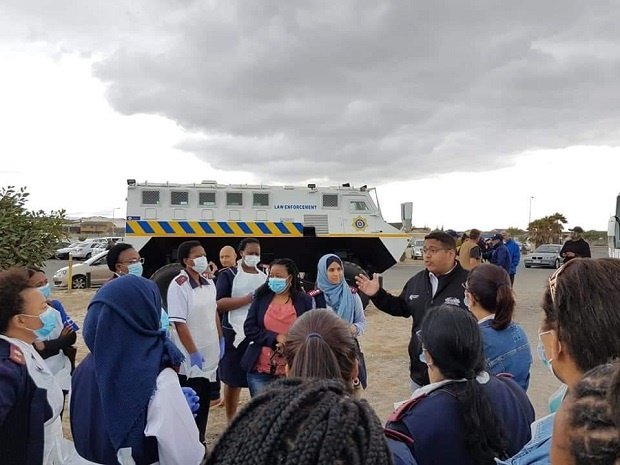

A number of African countries face lockdowns to prevent the spread of the new coronavirus. Authorities in some cases are taking extreme measures to combat the virus, which has killed more than 88 000 people globally so far.
While the virus was first detected in China, it has spread to every continent except Antarctica. Data suggests that those with compromised immune systems, comorbidities and healthcare workers are most at risk.
LIVE | More than 1.5 million cases of coronavirus registered worldwide
In South Africa, police have come under scrutiny for heavy-handed enforcement of lockdown rules. Police and soldiers have been accused of using excessive violence, despite President Cyril Ramaphosa’s directive that the public should be served with respect and responsibility.
The Independent Police Investigative Directorate is investigating police members for murder after three people died as a result of alleged police action during the lockdown.
News24 reported that soldiers could be on the streets until June.
Deadly action
Rwanda was the first country in Africa to declare a lockdown and two people were shot dead on 22 March, reported Time. However, police denied that the shooting was related to the lockdown and argued that it was because the men attacked an officer.
Across the Limpopo River, Zimbabwe imposed a similar lockdown to SA, but human rights groups criticised police for deadly action against civilians.
In Morocco, King Mohammed VI ordered the release of 5 654 prisoners to avoid contagion in jails, AFP reported. The jails in the country are overcrowded and ideal breeding grounds to the exponential spread of coronavirus.
However, there was no word whether members of the Hirak protest movement would be released as part of the programme.
Africa’s most populous country Nigeria imposed a lockdown on 30 March and it is battling both coronavirus as well as militant group Boko Haram.
Poor people who depend on the informal economy are most at risk in an economic shutdown.
There are also concerns that law enforcement officials are using extreme measures during the lockdown period.
“While acknowledging the size of the challenge and efforts made by authorities to fight Covid-19 across Nigeria, we are also concerned by reports and videos circulating on social media showing violations of human rights, that include beatings by law enforcement agencies tasked with ensuring compliance with the lockdown,” said Osai Ojigho, director of Amnesty International Nigeria.
The organisation called for support programmes targeting those in the informal sector, which makes up around 85% of the country’s economy, according to Reuters.
Women and children at risk
As in a number of countries around the world, the lockdown has also put women and children at risk from abusers, and Nigeria has not granted specific exemptions, activists argue.
In Kenya, there have been AFP reports that police fired on a market with teargas to disperse a crowd as lockdown rules took effect. The country’s flower economy has taken a huge hit as demand from Europe dries up and roses, ready for export, rot in ports.
The country is vulnerable to the coronavirus, especially in urban centres like Nairobi where up to 4.4 million people are crammed into informal settlements where residents often have to pay criminal “cartels” for access to water, reports The New Humanitarian.
In Uganda, police shot dead two men who ignored transport bans, AFP reported.
The Guardian also reported that authorities in the country are using the coronavirus lockdown to abuse vulnerable people in the LGBT community.
In a police raid 14 gay men, two bisexual men, and two transgender women were arrested for “congesting in a school-like dormitory setting within a small house”, according to police spokesperson Patrick Onyango.
At the time, the law prohibited gatherings of more than 10, though this has since been reduced to five.
Mali is battling the coronavirus as well as jihadists and the country has imposed a night-time curfew, reports AFP. These containment measures did not stop the parliamentary elections from going ahead, despite the fact that gunmen abducted the main opposition leader.
Amnesty International warned that countries which impose strict surveillance to tackle the coronavirus may leave a lasting legacy of the erosion civil liberties.
“As we come together to face this unprecedented crisis, it is important to have a long-term view of the measures we are undertaking to combat the virus. These may outlast the crisis and could define what surveillance in a post-Covid-19 world looks like. It is important that human rights for all remains at the centre of that vision for the future.”
– Compiled by Duncan Alfreds
– Stay up to date and stay healthy. Subscribe to Health24’s Daily Dose newsletter for important updates on the spread of the coronavirus. Register and manage your newsletters in the new News24 app by clicking on the Profile tab.
